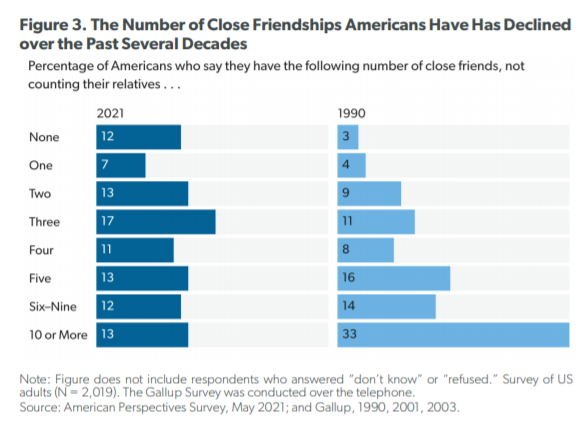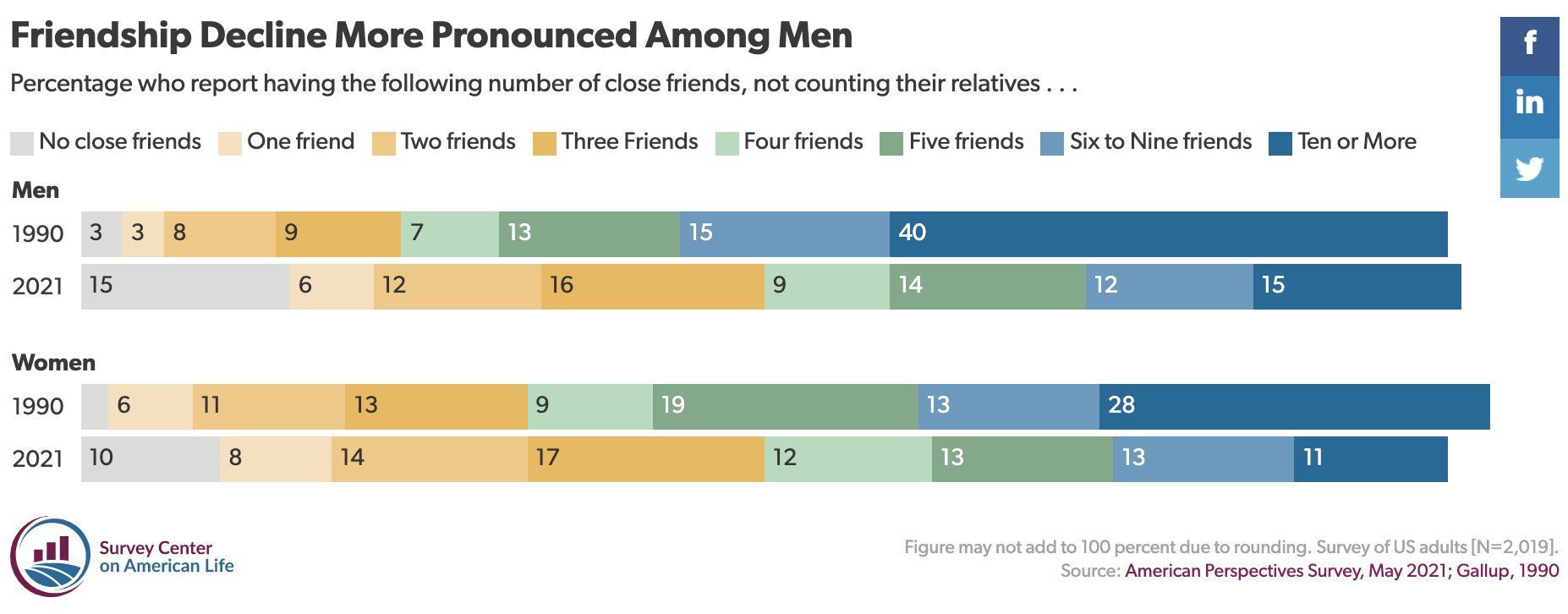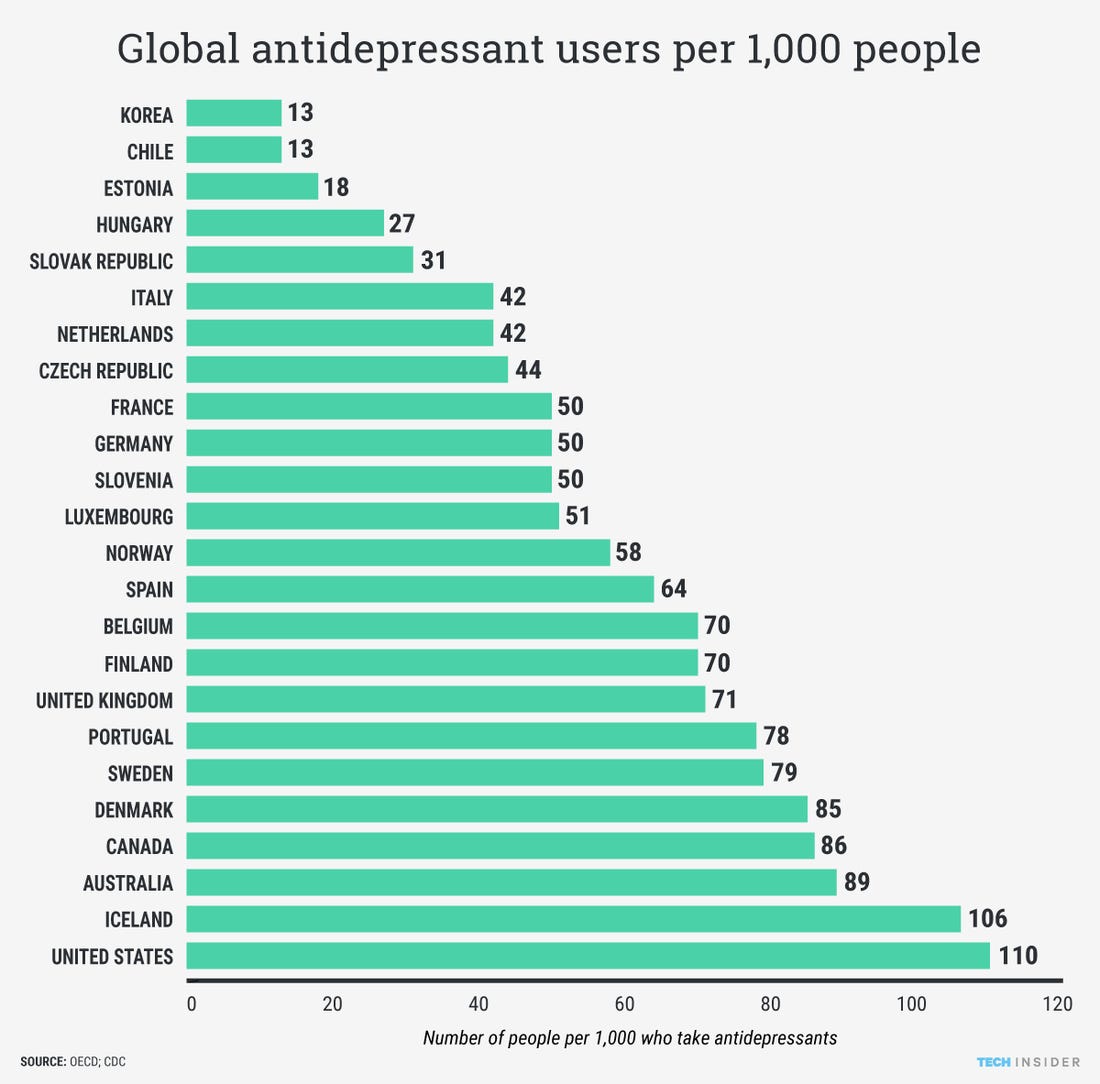Podcast: Play in new window | Download | Embed
Subscribe: Apple Podcasts | Spotify | Amazon Music | Pandora | TuneIn | RSS | The McFuture with Steve Faktor
This might sound crazy, but the TV show ‘Friends’ was even more preposterous than suspected…by New Yorkers, real estate agents, and psychiatrists. Like scraping together $500 for an emergency, most Americans can’t find three friends to rub together – much less five, in a luxury apartment, without rats the size of dachshunds.
As recently as 2004, the average American was satisfied with nine close friends, but a recent Gallup survey showed that number plummeting, especially for men. Why?? Let’s explore why this is happening and how we might be able to salvage this titanic social trend.
Friendship, Sinking
Here are Gallup’s findings:

In 1990, only 3% said they had no close friends. Today, it’s up to 12%! The rest of the chart isn’t much rosier. Except for how many claimed to have 10 or more close friends. That dropped from 33% in 1990 to 13% today. Good. No one has that many close friends, besides Santa and Putin.
In fact, there might be some definitional issues with the survey. Where does each person set their bar for “close friend”?
Here’s my “close friend” spectrum:
- Calls you on your birthday
- Drives you to the airport
- Helps you move
- Lets you crash in their home for a month
- Lends you $2,000
- Helps you hide a body
Anything less and they’re not friends, they’re Pokemon.
Can we rename Facebook friends "The Expendables"?
— Steve Faktor (@ideafaktory) June 23, 2020
If they don't call or text on your birthday, would never drive you to the airport, or put you up for a week in a pinch, they're not friends, they're Pokemon.
Things are worse among men.
Today, 15% say they have no close friends. Though both sexes showed major declines and 50% of each have three or fewer close friends.

In The Economics of Happiness I declared “happiness is the last thing left to innovate”. Given how strongly friendships predict life satisfaction, we’re sliding towards a serious happiness epidemic. And neither bat nor Fauci can help.
Why is This happening?
There are many reasons for declining friendships. Here’s my hypothesis on four big ones in the US. I suspect many developed countries have similar issues.
1. Aging Crew
Youth is a time of discovery…and captivity. We’re shepherded from school to sports to to parties to camps (summer, not labor) – with hordes of other kids our age. We make friends, discover music, find and smoke our parents’ pot.
But as we age, everything about us freezes in time. We settle on Elton John, a short list of favorite fritters, a haircut from our glory days, and a handful of comfy, relationships. Discovery ends. We become our parents.
Now, imagine this happens to an entire country.

In 1980, the median age of an American was 30. Still young enough to get past the bouncer at a club. Today, the median American is pushing 40 – and being dragged out of Studio 54, for looking 44.
As Tiny Dancer blares from the radio on our ride back to the burbs, and the bleeding subsides, we know our days of discovery are over. Barring any extraordinary feats of rejuvenation. Lip fillers.
And since it’s now fashionable to break everything down by race, what kind of unfashionable monster would I be to avoid it?

White people so old. So, so old. Even in a chart ending in 2014, the median white…aka vanilla…was over 43! Practically, eating steak from a blender. Other races are inching upward, too. But besides Asians, all others were under 35. (If you can find a more current chart, let me know.)
This makes me think of my dad, now 81, who I’m told is white, even though we’re Soviet immigrants who spent most of my child hood stomping roaches. He’s a reasonably healthy former engineer, who follows current events. He can work the internet, Android, and WhatsApp…at the approximate speed of global warming. He has three Kindles, for some God-forsaken reason. And, my number for unlimited tech support, a Groupon I don’t remember offering. Yet, he has no friends. Where’s he going to meet them? On FOX News FriendFinder? (That’s not a half-bad idea… They can call them Silver Foxes or Antiqfa.)
It’s sad he has no access to male camaraderie, intimacy, or an outlet to complain about my mom, who incidentally has friends, and wow do they get an earful!
From the macro to the micro, it’s not hard to extrapolate our recent political tensions and all the insecurity that comes with your best days – and relationships – entering the rear view mirror.
2. SinkinG birth rate
When you look deeper at why our median age is rising, a big factor is birth rates. They are PLUMMETING – here and across every developed nation.

The connection with friendships isn’t obvious, but hang in there…
Child-free adults convince ourselves we’re going to conquer industry, become Thelma and Louise, and live out every wild, care-free fantasy. Nope. We settle. In houses. With dogs. And Hondas. Not one car chase or gunfight to our name. This isn’t even Sisterhood of the Traveling Pants – or Travelling Wilburys. This is suburbia. And suburbia demands KIDS!
Not only are kids the main business model for the burbs – and 40-somethings, but kids are the final friend-discovery mechanism for adults.
Long after we’re far too hideous and decrepit to meet people in schools, bars, clubs, and parties, there’s kids. Their schooling, activities, and other obligations become our way of meeting and bonding with those who share a common purpose – keeping them off the pole and off the dole.
Even socially, without kids as a binder, middle-aged couples, divorcees, and singles have all the chemistry and majesty of a tent city under a bridge in LA.
What’s left? The dog park? Fido’s poop is not the stuff great friendships are made of.
3. PIlgrimage to cities
As I wrote in The Economics of Happiness, we’re crowded, but alone.
3. CROWDED BUT ALONE
No culture exalts individuality, independence, and hero worship like the US. That approach has created some revolutionary entrepreneurs and iconic achievements. But these days even when our heroes collaborate, they produce something more like The Avengers – a collective of self-absorbed assholes who prefer to do their own thing, in their own way, for their own reasons. Now imagine more people than ever being able to trade-in their “we” for “me”. That’s exactly what happened.
We’re on our own. Alone. By choice. Men and women started earning enough money to stay single longer. Pets and roommates replaced spouses. Those who do marry, divorce more often despite evidence that married people live longer. Birth rates in the West plummeted as it became cheaper to buy a yacht than raise a child. Many Americans would rather Kickstart a stranger’s company than pay for diapers and day care. Plus, old age just isn’t as scary in a world where meat arrives on Styrofoam instead of on its own four legs.
Long, child-free lives shift the burden of happiness from family and community to career…and the occasional trip to Jamaica. All our eggs sit in the work basket, hoping they hatch happiness – if we sit on them long enough.
– The Economics of Happiness
But we can’t talk about the rise of lonesome cities, with their hordes of Tinder zombies and office drones, without discussing the hollowing out of small towns and suburbs.
As blue collar work disappeared, so did youth, searching for opportunities. Their departure left aging husks of loosely employable residents, invisible to the information economy. Too old to re-train. Too tethered to depreciated homes with nearly-paid off mortgages. Some are addicted to prescription pacifiers or meth. Great friendships rarely spawn from decay. And we have lots of decay.
And the youth who left weren’t much happier for it. A whopping 22 percent of millennials say they have “no friends”. Trading community for tiny cubicles, tiny apartments, and a tiny taste of polyamory seems quite Faustian.
4. Capsizing of Community
When I first started thinking about our friendpocalypse, the first suspect was my phone. As I dictated my notes into its comforting abyss, I wondered, ‘Is this little time thief – and these avatars my…friends?’ Will any one of them rush over to clear my search history, if I suddenly die watching a Victoria’s Secret runway show?
But this trend pre-dates social media. In his terrific book Bowling Alone (published in 2000), Robert Putnam sifts through vast amounts of data on how we’ve become disconnected from family, friends, neighbors. It’s only now becoming more noticeable.
Just like the pandemic accelerated trends we were already seeing – remote work, remote healthcare, online delivery, mobile payments – social media did the same to community and relationships.
As we branch out to form virtual communities, we find them unwieldy, fleeting, cold, and lonely. Because they’re held together by weak bonds of interest (“I love sushi, too!”), not sturdy bonds of mutual necessity (“Let’s fix Bob’s roof!”).
Digital relationships are like M&M’s – satiation without nourishment. They create a placebo effect that slowly robs us of humanity.
Tech got way ahead of us. Our biology, psychology, economy and culture haven’t adjusted. And maybe never will. Maybe we triggered some weird new form of Darwinism, where only Kardashians and TikTokers survive, because they’re genetically optimized for “followers”, not “friends”.
In the meantime, we’re still tribal. That need for community remains innate, but increasingly out of reach.
3. We’re still tribal. We don’t rely on communities for physical survival anymore. Much of that has been outsourced to government and industry. Social security, sanitation, police, 401K’s, etc. Americans move out of the house by 18 (or run away by 12), but we still crave community. Ever wonder why there’s a Chinatown in every major city on Earth? (Even more in China!) We crave the company of others like us. Tribes were always built on need – finding, defending or capturing scarce resources. Or, an irrational love or hate of someone or something – real or imagined. With need gone, we cling to the irrational to glue our new, shoddy tribes together.
– 5 REASONS WHY BULLSH!T WON
Is This Bad?
What if we could use more quality time alone with Minecraft? Maybe the digital world works for many. And if you’re still reading this, you chose to spend it with me, a virtual stranger, instead of speaking with a co-worker or calling a sick friend. I might not even be real, just some bot tossing word salads.
Well, all the evidence shows this isn’t working.
As friendship declines, depression, drug use, suicides, shootings and and countless mental health indicators flash red. Only so many of these can be blamed on Tucker Carlson or Karl Marx. People are breaking down, focusing on the wrong things, withering in isolation, often self-imposed.
The good news is there’s hope.
what now, Captain?
Without realizing it, since 2010, I anticipated and mused about the many deaths that brought us to loneliness – death of masculinity, analog happiness, tolerance, truth, and . Today, they’re chapters in America’s autobiography. They chronicle the rise of people like Jordan Peterson and more broadly, self-help, therapy, wellness, and self-medication.
So what’s next?
I won’t pretend to have all the answers. But below are my best clues, so far, on how to overcome our loneliness epidemic.
[I’ll leave the broader challenge of happiness – and what institutions can do – for another time, but you can start with The Economics of Happiness. Over time, I’ll build on these themes in this newsletter and on The McFuture podcast and Patreon, so subscribe!]I divided potential solutions into three categories – stopping, starting, and hoping.
Stopping
Our days are filled with activities that drive isolation. I truly believe that those who can resist porn, social media, and other digital temptations will not only have a huge evolutionary advantage, but unlock countless hours to engage with others in meatspace. (No, meatspace is not my new adult website. It’s my shorthand for the real world.)
Who better to model what we shouldn’t do than those who built our e-ddictions? Bill Gates, Mark Zuckerberg and other Silicon Valley titans don’t let their kids near their own monstrosities. Their kids build go-karts, knit, cook and ostensibly, calculate their inheritances on an abacus. This is no accident.
Let's fuse these two points together.
— Steve Faktor (@ideafaktory) August 29, 2018
Internet, meet the real "#resist"
Guess who knows better than anyone that users don't make good dealers…?
Break the addiction or be ruled by those who did. pic.twitter.com/QCQDeqZyRK
Drugs, poor nutrition, lack of sleep, gaming, and overconsumption of entertainment, and overstimulation are all the things I did before writing this… The temptations are real. But the more of these we can stop doing, the more capacity we unlock for healthy activities. Like what?
Starting
In 2019, I wrote…
Life is servitude to our obligations. All contentment depends on it.
Obligations we choose bring satisfaction and joy. Ones imposed or mandated by circumstances feel oppressive.
– Obligations
I think the key to life – and reconnecting to others – is ruthlessly seizing control of our obligations – the implicit and explicit promises we make to our children, partners, and others we care about.
In a world that doesn’t need us, we must make ourselves needed. We simulate the necessity modernity took from us. For most people, that means having a family. I know that doesn’t sound especially hip or enlightened. But family always was – and will continue to be – the glue for every successful society throughout history. It also tethers us to reality in ways nothing else can. Not friendships. Certainly, not work.
Comedian Tim Dillon said it best, “Very few people are going to have a career that fulfills them on a level where they don’t have to have kids.”
I have friends without kids who are constantly finding new adventures. They’re satisfied with their lives and relationships. But others are desperately low on Netflix series to binge and new booties for their cats. Whether it was by conscious choice or cruel circumstance, this is a ship that always sails. Take it from a guy who’s watching his leave port.
Almost as important, is defining our values and living by our principles. This one’s not getting easier. With faith declining across the west, there’s no other vessel for values on the horizon. If there were, it would probably come from China, piloted by Captain John Cena and his crew of Uighur slaves. (In The Future Is Belief, I explore the chaotic state of filling the faith-sized hole in our lives.)
Those with stable finances and a useful skill can find meaning in helping those in need. For a long time, I taught success skills to high schoolers through Junior Achievement, but you do you. Just like faking a smile eventually makes you happier, helping others is the greatest form of self-help because it creates bonds that lead to discovery, that lead to meaning. Do enough meaningful things and eventually, they add up to purpose.
There are even “family-on-demand” services like Papa that match youth to lonely retirees. On paper, it’s perfectly engineered to steal their savings. No, I’m joking! It’s actually a great way to solve the loneliness dilemma, but I wonder if we have the will to make this model a success.
I once speculated that daily exercise, healthy diet, and a puppy could replace 70-90% of America’s therapy and antidepressant use. Just look at this chart and tell me we’re not being milked for profit.


As a first-time dog-owner, there’s nothing like a puppy’s bowel movements to force you out of the house regularly to engage with the world. The cuter the dog or sadder the rescue story, the faster you’ll make friends – or slowly descend into embarrassing baby talk with this furry ignoramus.
Hoping
Economics, politics, technology, and culture have powerful secondary effects on our lives. But I put them in the “hope” bucket. Most are beyond our control. At best, we benefit by understanding them. Changing them requires years of organization, toil and commitment – with no guarantee of progress. I’m not sayin not to fight for grand visions. They do matter. And they can help you meet others who share your passion. But if we’re solving for friendship, helping those around us, in humble but tangible ways, packs much more bang for the buck.
OK, this piece is far too long, already. To be continued…
If you enjoyed this, please share with others. The permanent weblink is here. (Or unsubscribe using the link below.)
Listen to this episode on The McFuture Podcast on your favorite podcast app or YouTube & support my work on Patreon, with lots of member exclusives, including forthcoming healthcare book.
Follow my raw, malformed ideas on LinkedIn & Twitter.
If your company needs a killer speaker, help figuring out the future, growth strategy, or what/how to innovate, email IdeaFaktory here.